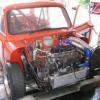Electric Supercharger..
#1

Posted 25 November 2010 - 02:52 PM
#2

Posted 25 November 2010 - 02:53 PM
#3

Posted 25 November 2010 - 03:01 PM
hahahahaha, no.
lol, thought as much
#4

Posted 25 November 2010 - 07:42 PM
#5

Posted 25 November 2010 - 08:02 PM
#6

Posted 26 November 2010 - 11:23 AM
The problem is that the cheapo ones on ebay are worthless.
What you need to realise is that you need a SERIOUS motor to drive a big enough compressor to force feed an engine at any sort of speed and since we're looking for a power boost here we are actually talking about an engine at full bore. It IS do-able and the ones used actually tend to use a motor to drive a compressor from a turbo (there are superchargers that do this too).
A conventional car's electrical system simply won't give that sort of motor the juice it needs without putting more of a draw on the engine than you wil gain from it.
To get around this you run a second battery to drive the motor usually a big deep cycle leisure battery. You run some sort of system to disconnect it from the car's electrical system when it is charged so that the supercharger runs exclusively from it and then when reverting to normal motoring it is re-connected and the electric motor is disabled so that it won't run and draw on the car's electrical system. You only get a short amount of boost and it then takes a while of normal motoring to re-charge the battery before you can use it again so for normal motoring it's not really practical but for a drag car......
You also have to bear in mind that the compressor when it's not spinning is a big restriction in the inlet so unless you also have valves on the intake tract to divert flow around it when working in NA mode it reduces the engine's power potential. Maybe the electric motor could be set to run at a much reduced tickover speed to reduce this? Plus all this kt is heavy so it has to be doing the job pretty well to give enough of a power boost to offset the extra stuff you are lugging around.
Practical for a daily driver - not really but with a shed-load of development work (like major manufacturer budget work) maybe.
Do-able - yes and it is done and delivers the goods within the limits I've mentioned.
I've seen a video of a petrol driven leaf blower being used and nearly 1000bhp on the dyno. There were pretty scant details on what else they did but again the principle is sound.
Iain
#7

Posted 26 November 2010 - 11:47 AM
Edit: I just looked up the power requirements of a leaf blower, typically 2200W, at 12V that around 180amps. Now that would need a serious alternator! For a 15second 1/4 mile run you'd need 45Ah battery minimum. would flatten even a 200Ah battery in less than a minute!!!
Edited by Wil_h, 26 November 2010 - 11:52 AM.
#8

Posted 30 November 2010 - 02:08 PM
though i was thinking more of a brushless motor hooked up to a turbo (to spin the compressor) that runs off lithium batteries.
my hobby grade motors i use for rc go upto 60k rpm before shattering, and the batteries can supply well above 200amps ....
maybe next year if i have time and money ill buy an A series and a turbo and give it a go....
#9

Posted 30 November 2010 - 02:19 PM
iv wonderd this too,
though i was thinking more of a brushless motor hooked up to a turbo (to spin the compressor) that runs off lithium batteries.
my hobby grade motors i use for rc go upto 60k rpm before shattering, and the batteries can supply well above 200amps ....
maybe next year if i have time and money ill buy an A series and a turbo and give it a go....
You'll need to be spinning two or three times faster to make a typical turbo compressor do the buisness.
#10

Posted 30 November 2010 - 11:02 PM
iv wonderd this too,
though i was thinking more of a brushless motor hooked up to a turbo (to spin the compressor) that runs off lithium batteries.
my hobby grade motors i use for rc go upto 60k rpm before shattering, and the batteries can supply well above 200amps ....
maybe next year if i have time and money ill buy an A series and a turbo and give it a go....
You'll need to be spinning two or three times faster to make a typical turbo compressor do the buisness.
gear it?
it must be possible, one bored day over the summer ill try work it all out
#11

Posted 01 December 2010 - 08:41 AM
This would be the best way to use a Rotrex, as driven from the crank they're a bit pointless.
#12

Posted 01 December 2010 - 08:52 AM
A turbo works by using the heat and pressure energy (which would overwise be lost to the atmosphere) and converting it to kinetic energy
#13

Posted 01 December 2010 - 10:13 AM
It's all about the Physics of Energy. To compress air, you need energy, in this case Electrical Energy. Produced by ? The alternator, that takes it's energy from the rotation of the crank, which takes energy from the explosion in the cylinder, which needs that compressed air to get a big enough bang. So no.
A turbo works by using the heat and pressure energy (which would overwise be lost to the atmosphere) and converting it to kinetic energy
Exactly. But even turbos take a good chunk of energy to spin, just a whole load less than an SC.
#14

Posted 01 December 2010 - 08:39 PM
I worked out that it would take around 2000 Watts to compress enough air to feed a 1275 at 6000 rpm, assuming that the pressure raise was 1 Bar.
Using a pint pot sized spindle motor from a bearing manufacturing machine (up to 180k rpm and a special controller - that bit was my job at the time) with compressed air cooled bearings, and 1/2 a modified T3 turbo I cobbled together an unfeasably complicated electrical charger. The motor controller required 48 volts DC, so a quintet of diesel Volvo batteries in the boot ran it for long enough to test.
It took about 2500 watts in practice, and I only got to 16 psi of boost, but it did do the job.
Only I couldn't fit the bonnet, put anything in the boot, or let anyone sit on the back seat.
Didn't try it at low revs though, in case it went bang.
Experiment over, I went back to a standard T3.
2500 Watts is only about 3 and a bit HP, and weather it comes from rotational efforts of the engine via an alternator, or from an increase in exhaust back pressure across a turbo, its still got to come from somewhere, but generates significantly more HP when it does.
Conservation of energy I suppose...
1 user(s) are reading this topic
0 members, 1 guests, 0 anonymous users
















